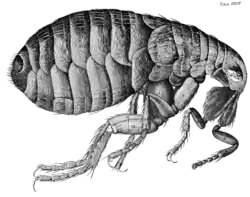blusa
See also: blusā
Latvian

Blusa
Etymology
From Proto-Balto-Slavic *blúšāˀ, from Proto-Indo-European *bʰluseh₂.[1]
Pronunciation
- IPA(key): [blusa]
Noun
blusa f (4th declension)
- flea (various small, wingless bloodsucking parasites of order Siphonaptera, famous for their ability to jump)
- blusas kodiens ― flea bite
- cilvēka blusa ― human flea
- ķert blusas ― to catch fleas
- uz netīras ādas parazitē blusas, kas izplata infekciju slimības ― dirty skin is parasitized by fleas which spread infectious diseases
Declension
Declension of blusa (4th declension)
References
- Karulis, Konstantīns (1992), “blusa”, in Latviešu Etimoloģijas Vārdnīca (in Latvian), Rīga: AVOTS, →ISBN
Lithuanian
Etymology
From Proto-Balto-Slavic *blúšāˀ, from Proto-Indo-European *bʰluseh₂.
Portuguese
Pronunciation
Audio (file)
Noun
blusa f (plural blusas)
Usage notes
- Usually means a short-sleeved or sleeveless top without collar or buttons, generally elegant. The term for a button-up dress shirt is camisa.
Spanish
Descendants
- → Tagalog: blusa
This article is issued from Wiktionary. The text is licensed under Creative Commons - Attribution - Sharealike. Additional terms may apply for the media files.